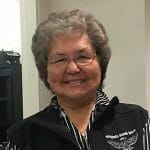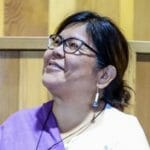When the historic Wáglísla band store was lost to a fire in 2013, community members in Bella Bella responded with quick-thinking, hard work, and a lot of love to build a new commercial complex specially tailored to the needs of Haíɫzaqv People.
Rebuilding the Heart of Wáglísla: Haíɫzaqv Invest in Community-owned Grocery Store and Bakery
Estimated Reading time

32 Mins
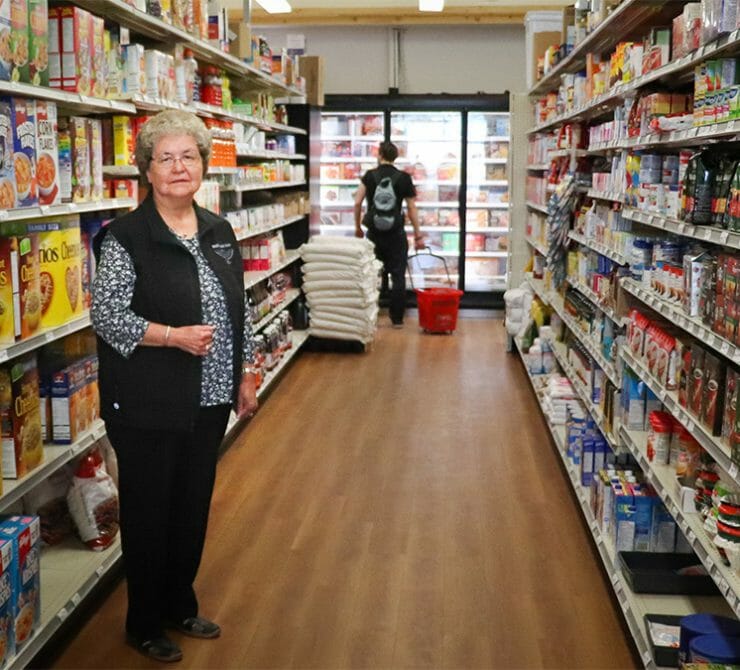
Wáglísla (Bella Bella) is the largest Haíɫzaqv (Heiltsuk) community, located on Campbell Island in the central coast region.
At a Glance
For over 50 years, the historic Wáglísla band store served as the sole grocery store in Bella Bella, providing essential goods to Haíɫzaqv People in this remote location in the central coast region.
When the store was sadly destroyed in a fire in 2013, the community—spearheaded by long-time store manager and Haíɫzaqv Matriarch, Pat Housty—rallied to set up a temporary store that continued to serve the needs of Wáglísla (Bella Bella) residents.
Recognizing the need for a permanent location, work began in 2016 to construct a new commercial complex with a grocery store and a post office to serve the community. Since its grand opening in 2017, the new Wáglísla store is once again the core of Bella Bella and serves as a shining example of how a community has overcome tragedy and built successful, locally-minded businesses.
Providing for the Haíɫzaqv People Throughout History
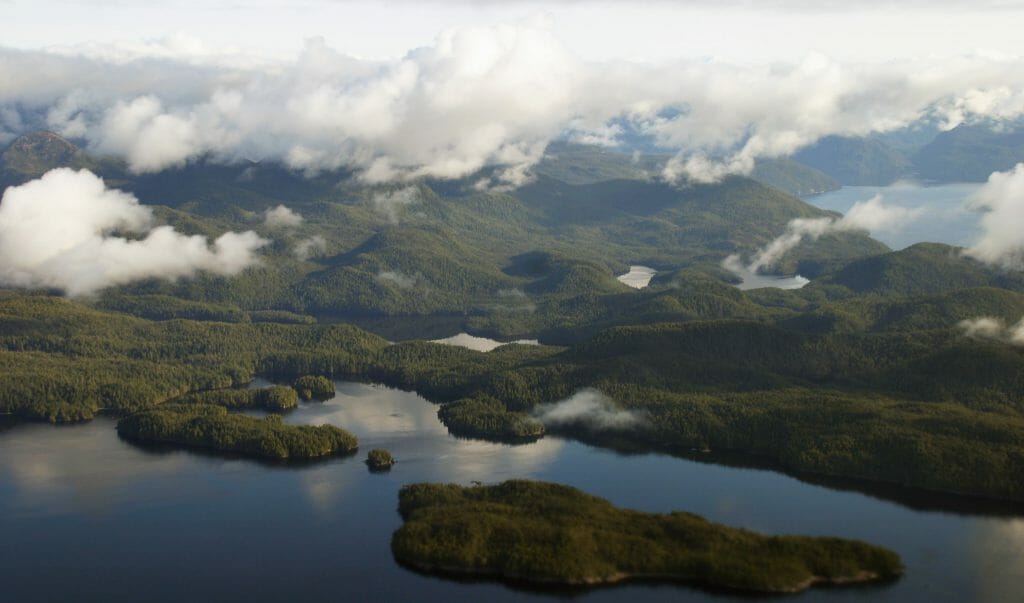
For thousands of years, the Haíɫzaqv lived solely from the wealth provided by the lands and waters of their vast territories. Along the central coast of what has become known as British Columbia, Haíɫzaqv territory extends from the southern tip of Calvert Island, up Dean and Burke Channels as far as Kimsquit and the head of Dean Inlet to the northeast, and up the Mathieson and Finlayson Channels to the north. The ocean, watersheds, estuaries, and forests sustained generations of Haíɫzaqv in the years before colonization.
In spite of the destruction and disease brought by colonization, Haíɫzaqv continue to harvest foods using traditional methods across their territories through the seasons. Yet, in the remote Haíɫzaqv community of Bella Bella, the grocery store—selling everything from groceries and household goods to fishing supplies—holds an essential place in the daily lives of Haíɫzaqv People. For over 50 years, the store has been, perhaps, the most critical business serving the community.
It was particularly devastating to the small community when the building that housed the grocery store, post office, café, and library was lost to a blaze that broke out in the early morning hours of July 12, 2013. The incident demonstrated not only how important the store was to the community, but also how quickly the town could come together in the face of disaster.
Responding to Tragedy with Quick-Thinking and Creativity
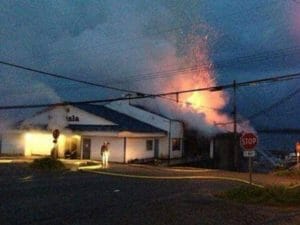
Pat Housty recalls the fire and the loss of the store with emotion. “We really had to do some quick thinking to get things running because there was absolutely nothing in the community,” she says. “But things came together so quickly.”
Housty, undoubtedly, is as important to the community as the store itself. She has worked at the store since 1972, most of that time in a management position and, many would argue, is the heartbeat of the operation. Her drive, she says, comes from wanting to support the community. “Everything we do is for the community. Whatever arises, we arise with the need for the community.”
In 2016, her efforts were honoured with a BC Medal of Good Citizenship recognizing her immense contributions to the community of Bella Bella, not the least of which is her time spent managing the store.
In fact, it was Housty’s quick thinking and action that ensured a temporary store was up and running on July 14, just two days after the fire. Supplies for the original store were about to be shipped from Vancouver on the day of the fire—within a few hours of the blaze, Housty was on the phone with the supply company ordering an additional load to provide the community with essentials. “The same day, we started cutting material and putting up shelves while I was standing there watching the store burn.”
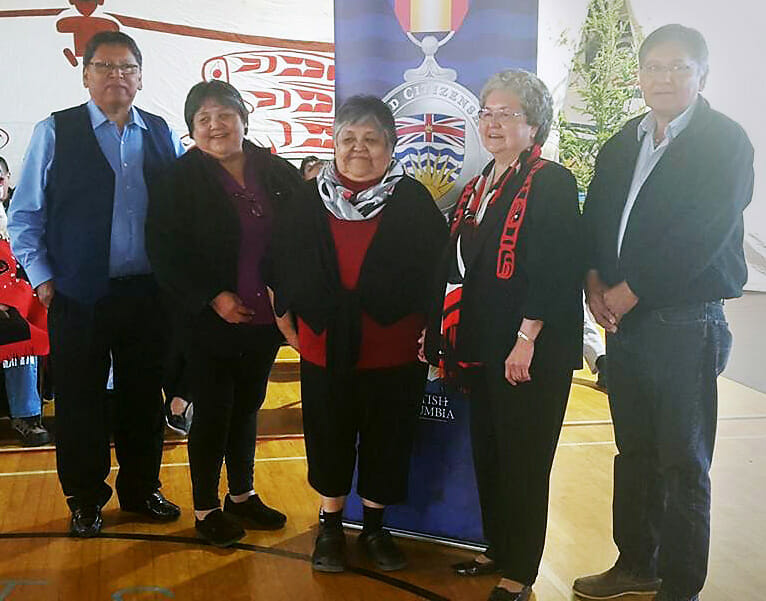
Zux̌valaqs Leona Humchitt, chair of the Heiltsuk Economic Development Corporation (HEDC), says the community worked together to quickly set up a temporary store. The United Church offered their space to house the store for a short term, and close colleagues regarded as friends of Housty flew to Bella Bella on their private plane to help install cash registers and fax machines.
“It’s amazing how our community comes together in a crisis,” says Zux̌valaqs. “It propels us to give rise to our traditional values instilled in us to work together and support one another.”
It’s amazing how our community comes together in a crisis. It propels us to give rise to our traditional values instilled in us to work together and support one another.
The Thistalalh Reading Room Rises from the Ashes
Simultaneous to Pat Housty and her team’s efforts to create a temporary store location, other community members were organizing to restore additional services that had also been lost in the fire, such as the beloved Thistalalh Reading Room.
Run by the Qqs Projects Society since 2007, the Thistalalh Reading Room was housed in the same building as the store and had served as the first all-ages public library in Wáglísla. It had also grown to become an increasingly important gathering space for the community over the years. So when the space and all of the Library’s 4,000 books were destroyed in the blaze, it was a heartbreaking loss that spurred the community to quickly organize to replace this deeply treasured hub.
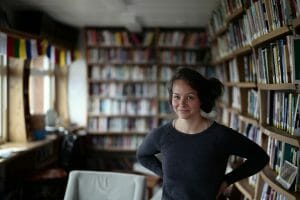
Less than one year after the fire, thanks to several book drives, donation campaigns, and the tireless rallying efforts of many, including ‘Cúagilákv Jess Housty—Qqs Projects Society Communications Director and Heiltsuk Elected Councillor—the new Thistalalh Memorial Library opened its doors in March 2014.
Pivotal to the library’s quick re-opening was the donation of a 40-foot modular building, including transportation to Bella Bella and on-site installation, by the Lieutenant Governor’s Write to Read program. “It would have been impossible to rebuild so quickly without that donation,” notes ‘Cúagilákv.
Since the fire, the library’s carefully curated collection has been lovingly rebuilt and has nearly doubled in size, with several books now populating a sizable library at Qqs’ community healing facility in Koeye. And while devastating, the original library’s destruction and quick revival further cemented the library’s special role in the community. The new library also serves to demonstrate how, despite having suffered a major blow with the loss of so many crucial services in one fell swoop, Wáglísla residents prove to be undeterred, time and again, in charting a positive path forward in the face of tremendous challenges.
Building a New Store in Wáglísla
Pat Housty managed the temporary store for two years out of the church before it moved to another provisional location where it would operate for another three years.
While the temporary store locations had proved to be a lifeline for the remote community following the fire, staff and Haíɫzaqv leadership recognized the need to rebuild the grocery store as a new commercial complex that would enhance services for Haíɫzaqv People in a new permanent location. Neither of the temporary spaces were large enough to adequately supply customers, nor were they designed to keep groceries fresh for consumption.
As noted by Zux̌valaqs, “[Heiltsuk Economic Development Corporation’s] strategic orientation is long-term planning for sustaining our future generations.” It was thus with this forward-looking strategy in mind that HEDC started looking to create a long-term solution, eventually leading them to partner with Coast Funds in 2016 to invest in the construction of a new commercial complex right in the heart of the community.
To oversee the construction of the new building, Heiltsuk Tribal Council (HTC) hired Paragon Project Management Inc., with the company’s principal Larry Marchand serving as project manager. Marchand had worked with the Council since 2013 when Paragon was originally hired to manage the construction of the interior of the temporary grocery store. Since that time, Marchand and his company has managed a number of projects for the Tribal Council and HEDC. “We had become almost like a virtual extension of their organization, coordinating procurement under their direction,” recalls Marchand. His experience working on the temporary store, a 10-unit accommodation complex, and a number of home renovations had taught him how to work effectively in the community.
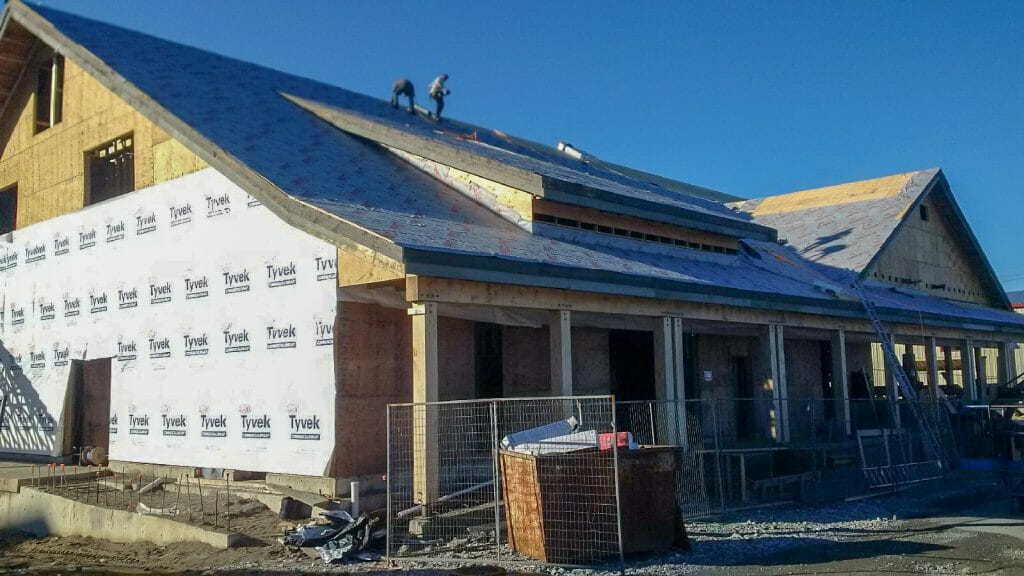
Marchand worked closely with HTC to ensure that, as much as possible, the planning and construction of the new grocery store was designed for and with Haíɫzaqv resources. “One of the things we were mandated to do at the beginning of the new grocery store project was to include as much local content as possible,” he says.
“We wanted a design that was suited for a remote marine environment, a First Nations environment, that would create the most opportunity for the available capabilities within the community.”
We wanted a design that was suited for a remote marine environment, a First Nations environment, that would create the most opportunity for the available capabilities within the community.
As an example, he points to the construction of the building—a wood framed building, with wood sidings and a roof with shingles. He says that design not only suited the local environment, but allowed them to work with locals who might not have the same extensive construction experience you might find in a larger city.
Five Haíɫzaqv people were hired to work on the project, and received peer-to-peer learning and mentoring opportunities throughout the duration of the contract. The model that eventually emerged from building the new store has been applied to subsequent construction projects in the community, such as Gvúkva’áus Haíłzaqv (Haíɫzaqv Big House) that opened in October 2019, for which Paragon was again hired by HTC along with a crew of eight local staff.
“The model that we developed during the grocery store project has continued to evolve,” says Larry Marchand, largely crediting the success of subsequent development projects in the community to lessons learned while constructing the commercial complex that now houses the new grocery store, bakery, and post office.
Opening Day
On November 29, 2017, the new Wáglísla commercial complex that includes a grocery store, bakery, and post office opened its doors to the community. The new building is 10,000 square feet of retail and storage space—more than double what the temporary store offered.
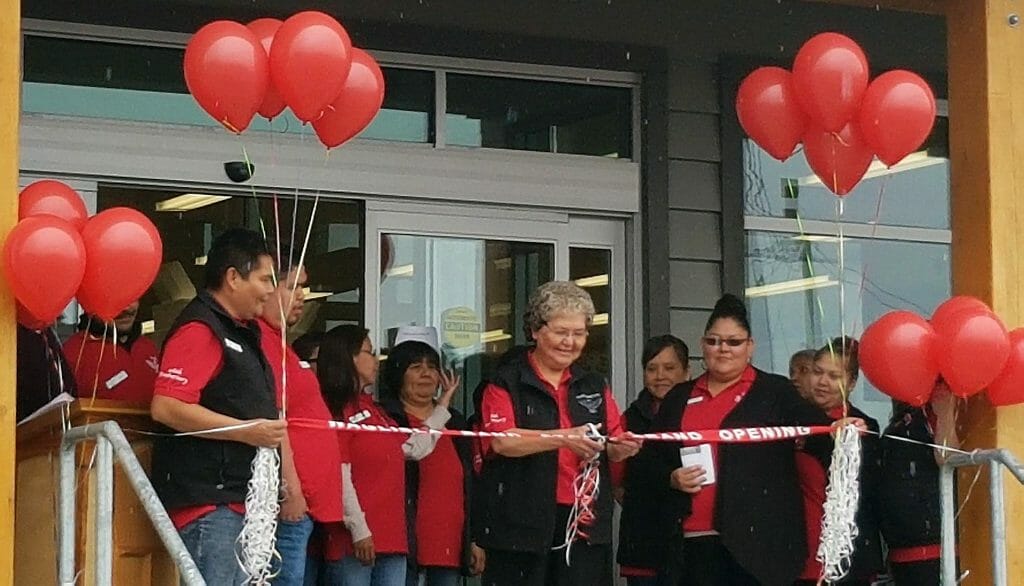
“The whole community was out there waiting to come in and see our new store,” recalls Zux̌valaqs Leona Humchitt.
“It was standing room only,” adds Pat Housty. “You couldn’t go anywhere if you wanted to. There were a lot of people.”
Community members were invited to tour the newly expanded grocery store—including the first fresh bakery in Bella Bella—as well as a new post office and liquor store that had been rebuilt to replace those destroyed during the fire.
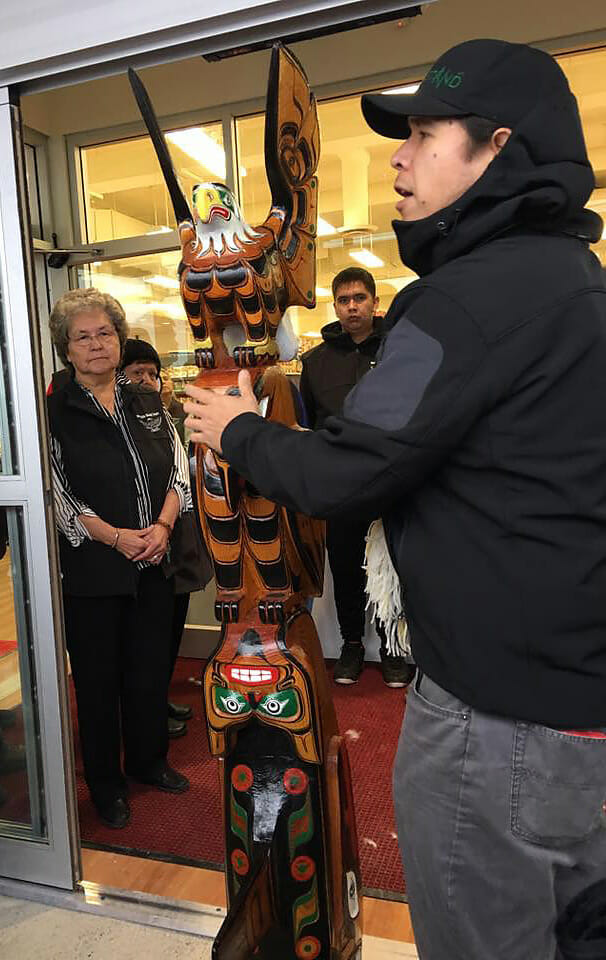
Not only is the permanent location bigger; the new grocery store had also been custom-designed to suit the local environment, and purposely stocked with goods to meet the unique needs of Wáglísla residents. The emphasis that had been placed on local suitability was on full display on opening day—from the unique wood framing and sidings, to the etched glass windows featuring designs from local Haíɫzaqv artists.
Zux̌valaqs stresses the significance of including artwork created by local artists in the store’s design. “I love the statement by our Elders that our ancestors marked up our territory with petroglyphs and pictographs,” she remarks. “Donning our local Haíɫzaqv artists’ work on our store gives this key and central building authenticity and depicts our special brand of being Haíɫzaqv.”
In its new and bigger space, the store is now better suited than ever to carry on its central mission of taking care of the community. Thanks to the additional shelf space and storage capacity of the new space, the store can now stock specialized products that haven’t previously been available to Bella Bella residents, such as gluten-free products and other specialty items. “We work closely with the community and we find out peoples’ needs. We make sure that everybody is taken care of,” says Housty.
“We’ve tried to fill every capacity for the community,” she continues. “We’ve increased product by quite a large amount from what we were doing previously, it’s continually on the incline.” In fact, the demand for new and diverse products is so great that the store may have to use the temporary grocery store space during busy seasons like Christmas.
Besides a new meat cutting department, a particularly exciting addition to the store is a brand-new bakery, which had been identified during community consultations as a sorely needed and highly desired asset in Wáglísla.
Pat Housty says they weren’t sure how well they would be able to pull off the operation of a bakery, but they received a lot of support from their supplier. “He came in for a few days of training and it just took off from there,” she says. Now the bakery is steadily busy selling from the store and catering for local events. “[Bakery staff] are accepting all the challenges as they arise, so that tells you we’ve got the right people in there,” she says.
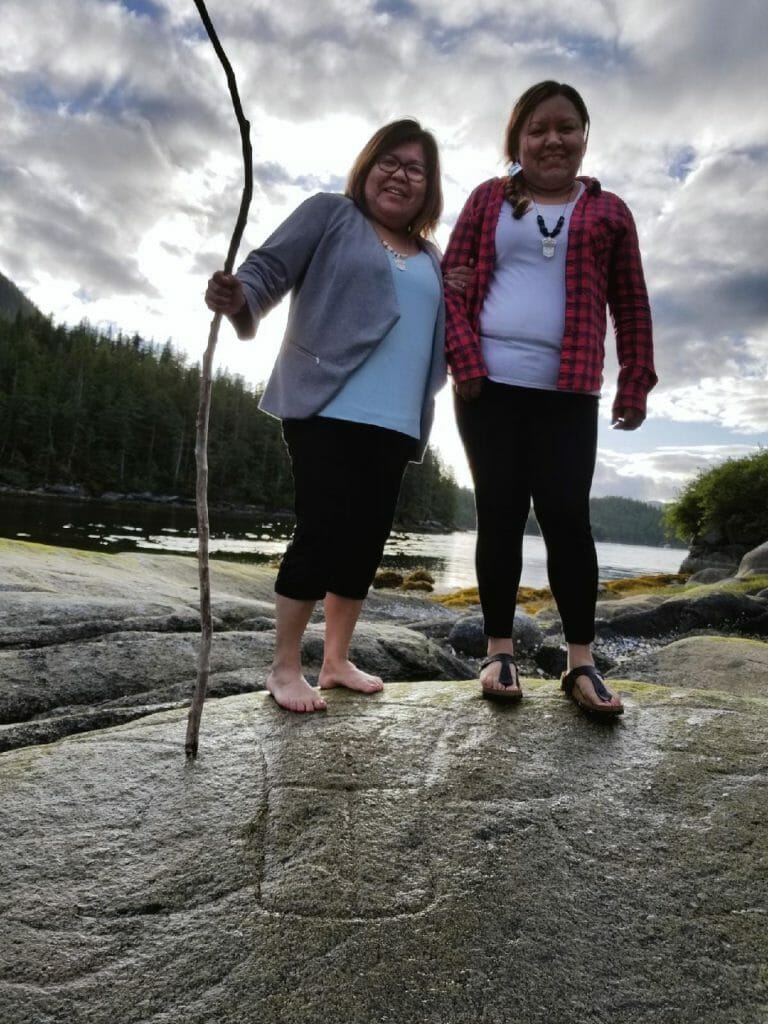
The new bakery is just one example of how the store is helping to fulfill the cultural needs of the community. “We’re really strong in our culture and our identification as a people,” says Housty, pointing to the many large gatherings, such as weddings and feasts, that regularly occur in Wáglísla. More often than not, the store plays a central role in providing for guests on these occasions. “The families come here and put in their order. Because they’re big community gatherings, and they’re putting in special orders to make sure all those needs are met.”
All of this, Housty and Zux̌valaqs say, makes the store a hub of the Haíɫzaqv community. “This is our downtown and very much a social destination for quick visits and chats,” notes Zux̌valaqs, recounting a recent time when she and her son were going to the store to pick up some necessities—a trip he was happy to make, with the following request: “Don’t stop to talk to everyone, mom!”
Continuously Learning and Responding to Challenges
Since permanently re-opening in 2017, the new Wáglísla store continues to adapt and grow in order to best provide for Haíɫzaqv People and others in the central coast region that visit Bella Bella. With Pat Housty and her dedicated staff at the helm, new and ongoing challenges are met with the same unflappable resolve that has kept the store in operation for over half a decade — with new lessons and best practices constantly being developed along the way.
Keeping Costs Down
Like in many remote towns, community leaders and businesses in Bella Bella are frequently searching for ways to make goods more affordable for local residents. As a community that is only accessible by water or air, this can be especially challenging in Wáglísla. In spite of this, Housty and her staff continue to find creative ways to work around the difficulties of running a business in an isolated location.

Housty notes how reliant the community is on the ferry service as a major determining factor in the affordability and freshness of products. “[The ferry] is kind of our staple that we depend on,” she says, explaining that an unexpected delay or change in the sailing schedule can have huge ripple-down effects on the store’s operations.
Freight costs are also a big consideration. Housty and others have discussed possible ways to tackle prohibitive shipping costs in the hopes of lowering the price of consumer goods in Wáglísla. She is hopeful that things will improve over time, and remains committed to finding workable solutions in the meantime. “We try to keep costs the lowest we possibly can for the community, while trying to keep the quality as well. It’s an ongoing game,” she says.
At the end of the day, while recognizing the inevitable constraints posed by Bella Bella’s remote location, Housty and her staff do everything they can to ensure that everyone in the community is taken care. “It’s all about community, and it’s all about the people in the community,” she says.
Focusing on Community
The Wáglísla grocery store has always been managed with a focus on understanding, and catering to, the people of Bella Bella. When the historic band store burned down in 2013, the community responded by doubling down on this objective — by first quickly creating a set of temporary solutions, then working together to build a new permanent space that was purposely tailored to the community. Zux̌valaqs Leona Humchitt and Pat Housty believe that this ongoing prioritization of the community helps to explain the store’s sustained presence and value in Bella Bella, despite repeated challenges.
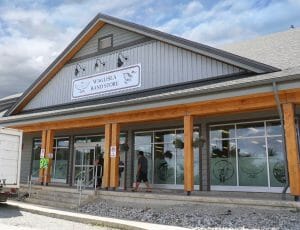
Larry Marchand echoes Housty and Zux̌valaqs’ sentiments in describing his experiences working with Heiltsuk Tribal Council. “The integration of outside non-First Nations resources into a First Nations community requires trust,” he says, as well as strong communication skills and an attentive appreciation of local nuances. To that end, Marchand credits key associates who have been instrumental in helping to create a trusting relationship with Haíɫzaqv leadership over the years, including Paragon senior building manager Gerry Stanley, as well as Pamela Wilson who served as Assistant Project Manager during the Gvúkva’áus Haíłzaqv construction project.
As such, learning to understand, and adapt to, the cultural context of Wáglísla has been an educational and ongoing learning experience for Marchand and his team, and something which he believes results in a better final product, as demonstrated by the thoughtful integration of community needs and characteristics into the grocery store’s design and build.
Merging Business Sense with Emotional Intelligence
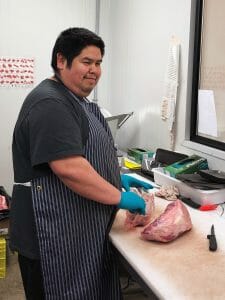
Having observed many of the store’s triumphs and drawbacks over the years, Zux̌valaqs Leona Humchitt is quick to point to another key factor in the store’s continued survival and accomplishments: the strong relationship that has been fostered over time among store employees and with the community.
“[Pat] is very in-tune with the needs of her employees,” says Zux̌valaqs, “and making sure that they feel valued and instilling that value creates opportunities for people to stay. Pat has strong emotional intelligence and deploys it every day, investing in the due care of her staff.” Having a crew of long-term and dedicated staff working the front lines, in turn, creates a stronger and better store. For Pat Housty, this invaluable human asset is a big part of what drives the operation. “The staff that we have are just so into what is needed to be a part of the operation,” she explains. “They enjoy what they do and their rapport with the community is so good.”
Social Outcomes
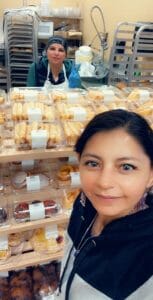
The Wáglísla store employs 13 local members of the community. Adding a new bakery and meat counter to the store’s operations led to the creation of three new full-time staff positions, and has also resulted in lower costs for customers as more goods can now be prepared on-site rather than arriving by freight.
While the store was being constructed, five local Haíɫzaqv people were hired onto Larry Marchand’s crew thus providing temporary employment and lifelong construction skills training to people in the community.
Environmental Outcomes
While the destruction of the historic band store dealt a major blow to the residents of Bella Bella, building a brand-new store from the ground up created an opportunity to design a more modern and energy efficient building than the original. This has translated into both cost and energy savings and will ensure improved building longevity into the future.
An additional environmental benefit can be credited to the use of local labour and resources during the store’s construction, thereby reducing the need to rely on energy-intensive transportation methods to complete the project.
Economic Outcomes
Building a new grocery store in Wáglísla has resulted in many economic returns for the community.
The construction project was a boon to the local economy, with many spillover benefits felt by other businesses, like Heiltsuk Freight, which was used by most of the project’s contractors to ship outside building materials. Other businesses, like Lama Pass fuel, local food service and accommodation providers, and the Bella Bella sawmill and forest company also noticed increased revenue during the store’s build, thus amplifying the new store’s economic impact on the community.
Additional shelf space allows the store to carry more inventory, meaning locals can more readily purchase items in Bella Bella instead of going on costly shopping trips out of town. Moreover, the store’s business expansion—with the addition of a new bakery and meat counter—means residents and businesses alike benefit from a wider array of selling and purchasing options in Wáglísla. The new store’s improved storage, refrigeration, and layout drive costs down even further by preventing unnecessary spoilage and operational inefficiencies.
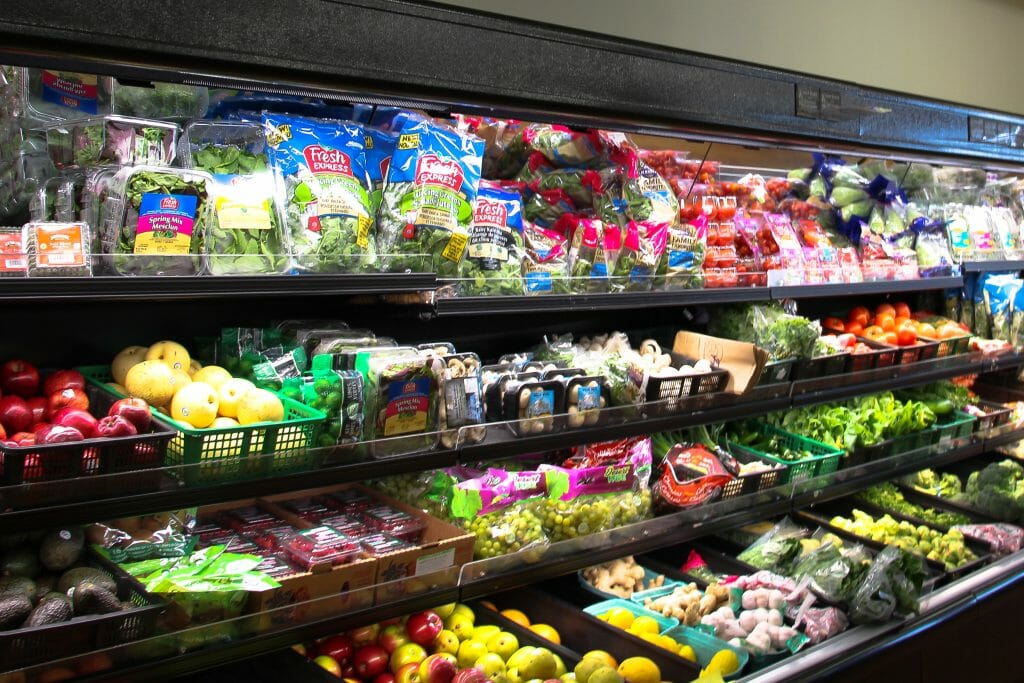
The construction of the new grocery store also played a key role in further developing a close and trusting business relationship between Heiltsuk Tribal Council and Paragon Consulting, with the two choosing to partner on subsequent projects in the community given their previously positive and mutually-beneficial experiences working together.
Cultural Outcomes
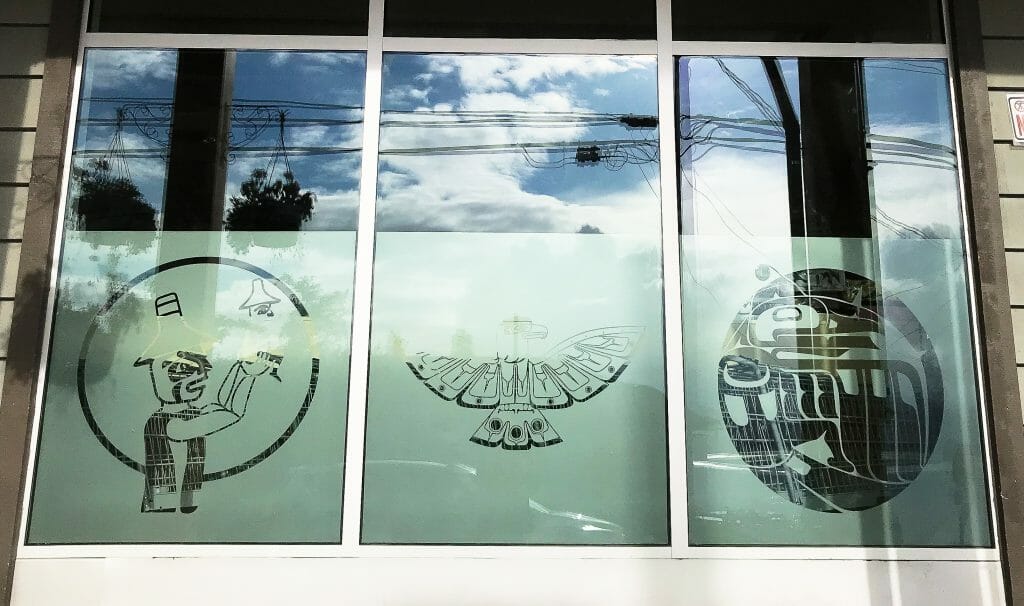
Besides providing for the commercial needs of the community, the new store has also become a space to showcase and strengthen Haíɫzaqv culture.
The store’s logo and window designs serve as a visual marker of cultural pride for the community. “We put a lot of thought into the logos we were considering and we made a list of the people that were a big part of our operation and community over all the years,” explains Pat Housty. “We took a piece of their art and had it made into a design to be etched into each window.”
The store also supports Haíɫzaqv cultural events by providing catering services to numerous ceremonial and community gatherings throughout the year. “[The store] is definitely culturally-appropriate because it meets the needs of all our different community events, from feasts to Potlatches to the Big House opening,” says Zux̌valaqs Leona Humchitt, who calls this focus on cultural suitability and local service the store’s ‘quadruple bottom line.’ “The cultural aspect has been very much a part of the work that we do,” she says. “Our people can really identify as a Nation, coming together and having this place to support us.”
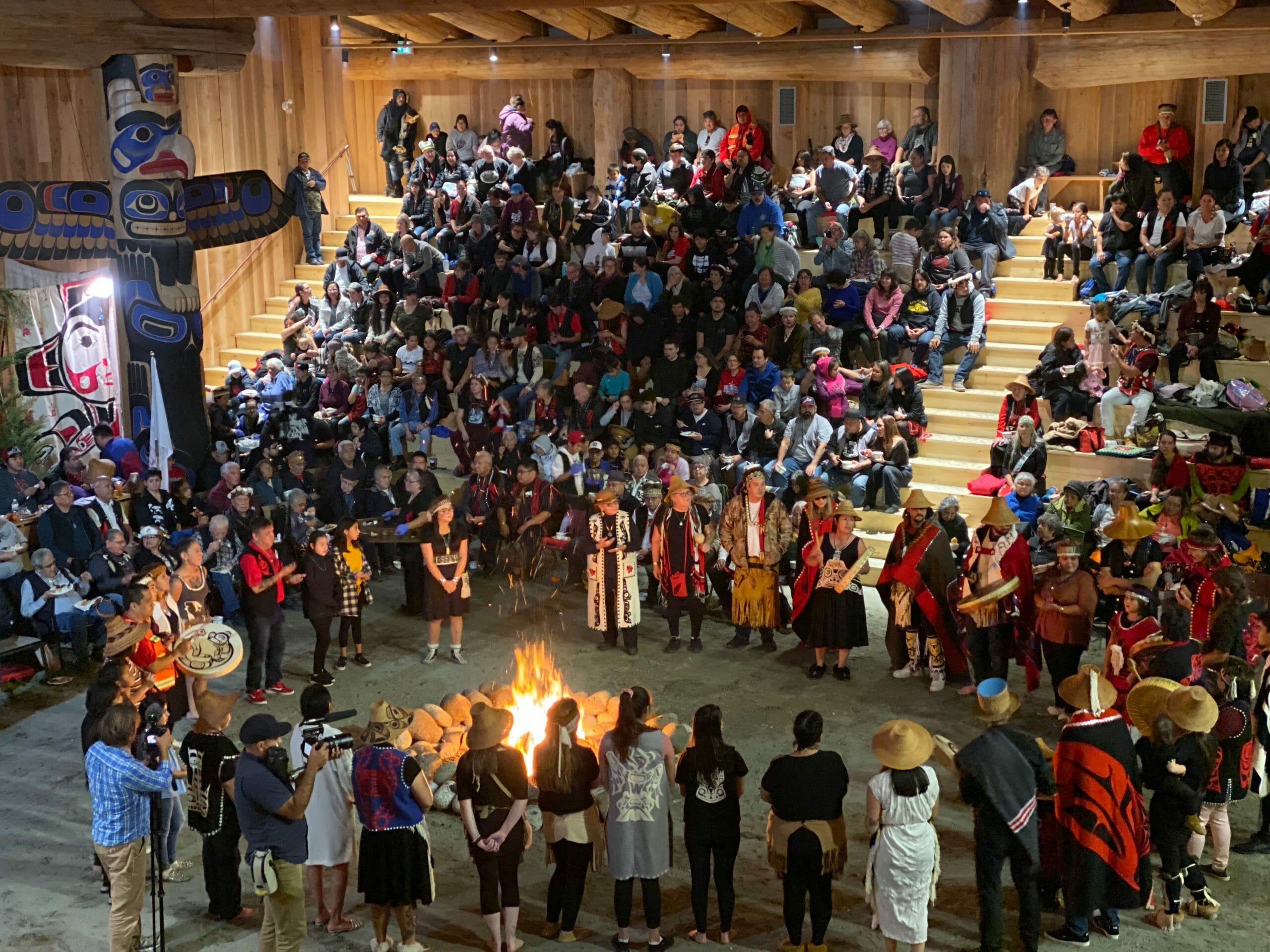
Between 2016 and 2017, Coast Economic Development Society approved funding of $2,000,000 towards the construction and start-up of the Wáglísla grocery store and bakery in Bella Bella.
Online Resources
- “Food is Medicine” Healthy Eating Challenge Community Spotlight: Heiltsuk Nation
First Nations Health Authority, March 2019 - She’s Planting the Seeds of Indigenous Food Sovereignty
The Tyee, December 2018 - Pat Housty Honoured for Over 40 Years of Service to Community of Bella Bella
Coast Mountain News, 2016 - Honours and Awards for British Columbians
The British Columbia Honours and Awards Advisory Team - Wáglísla Grocery Store Facebook
Wáglísla Grocery Store Facebook - Bella Bella Community Devastated by Fire
Global News, July 2013 - Small B.C. Town Picks Up the Pieces After Devastating Fire
Vancouver Sun, August 2013 - In Bella Bella, a Library Reborn with the Gifts of Strangers
The Tyee, March 2014 - ‘The Heartbeat of Our Community’: Heiltsuk Open Historic Big House
The Narwhal, October 2019
Published On February 11, 2020 | Edited On January 23, 2023
